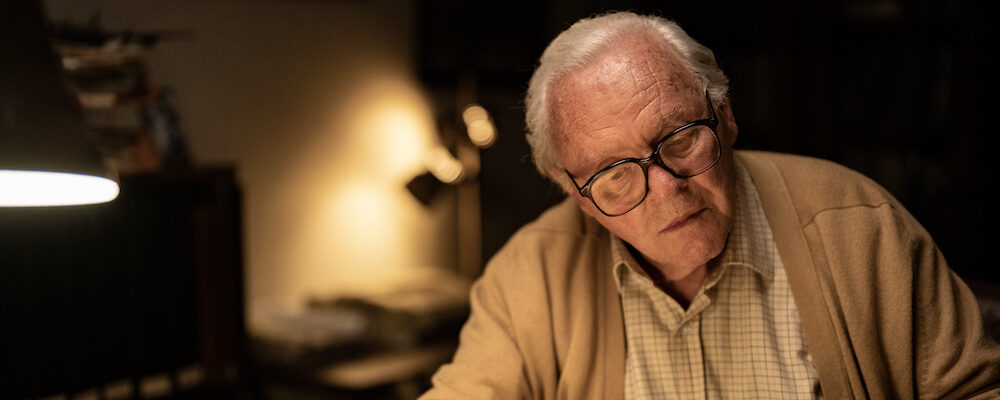‘One Life’: Anthony Hopkins Is Superb as a Humble Holocaust Hero in Stirring British Biopic
Sandra Miska
“One Life,” a moving biopic about an Englishman who saved hundreds of Jewish children from the Nazis, had its genesis in a viral video, of all things. The producers saw the video that has been viewed over 40 million times, a 1988 clip of the British program “That’s Life,” in which Sir Nicholas Winton is surprised by an audience full of some of the 669 children he saved 50 years prior in the early days of World War II. Still, decades after the man known as the “British Schindler” became an internet sensation, many do not know the extent of Winton’s heroic actions, and this film adaptation of his daughter Barbara’s book, “It’s Not Impossible,” brings to life his extraordinary story.
The great Anthony Hopkins plays the older Winton, a man of great humility who went decades without any recognition. In 1987, he hears a new story about refugees on the radio, and is inspired to take a look at a scrapbook of children he has tucked away in an old briefcase. Flashbacks to half a century prior show young Nicky Winton (Johnny Flynn), a stockbroker whose socialist beliefs lead him to activism, traveling to Czechoslovakia to help refugees who have been displaced by Hitler and his invading armies. Prague is still neutral at this point, but it is only a matter of time before the entire country falls to the Nazis, and Nicky comes up with an idea that seems almost impossible, and that is to transport as many children as possible to England.
Nicky’s plan is far from a simple one, as it involves gaining the trust of the childrens’ parents, lining up Foster parents in England, and a labyrinth of bureaucracy. Fortunately, he is far from alone, as he has his fellow activists in Prague (Romola Garai, Alex Sharp, Juliana Moska), as well as his own mother, the indefatigable Babi (Helena Bonham Carter), on the ground in England. Eventually, his responsibilities call for him to join her back home.
Flynn recently spoke with Entertainment Voice about what drew him to Winton’s story. “There are these new kinds of conflicts erupting around the world, and there are huge numbers of innocent victims in the crossfire of these moments and situations, especially children. I thought it felt like an important story to tell at this moment in history. We’re sort of hearing echoes of what is happening now in various parts of the world.”
The actor was also inspired by Winton’s lifetime of service and determination to always do what’s right, as well as what he refers to as his “practical logic.” He points out that the same skills that made him a successful banker were also useful when it came to doing a lot of the behind-the-scenes, less visible activist work. But that’s not to say that Nicky’s emotions never came into play. Because the refugees were predominantly Jewish, he must go to a rabbi to obtain a list of vulnerable children, and a moving conversation about identity transpires. The religious leader asks him about his own background, and he explains that although he had German-Jewish grandparents, he was baptized Christian and now identifies as agnostic. “What does that make me?” He asks. “A Jew,” is the answer he receives.
Years later, with encouragement from his wife, Grete (Lena Olin), Nicky looks for a new home for his scrapbook of children, perhaps a museum. Although he is not interested in drawing attention to himself, he admits to an old activist friend (Jonathan Pryce) that he is curious about what became of the kids. Hopkins is magnificent as this introverted man who has a lot going on under the surface. Flashbacks reveal that he did indeed become personally invested in the wellbeing of the children he helped, as well as their families.
Hopkins’ scenes were filmed before Flynn’s, and the younger actor had the opportunity to watch the Oscar-winner at work. He revealed, “It was very helpful, because I could watch him and absorb some of his energy. I was paying a lot of attention to his performance and the rhythm that he held as Nicky, and his mannerisms.”
He continued, “We have some footage of Nicky as an older guy. But not very much when he was younger. So, alongside reading a lot about him and watching Anthony’s performance, I had to kind of conjure somebody who I think kind of married those things together. And, when I was in Prague, I got to watch the scenes of Anthony on my phone.”
Both Hopkins and Flynn do a remarkable job of conveying Nicky’s quiet devastation about not being able to save every child. As older Nicky explains to Betty Maxwell (Marthe Keller), the wife of a newspaper magnate who takes an interest in his story, it was really a lottery for the kids, as the foster parents picked out from a catalog who they were willing to take in. For example, two brothers find a home, but their younger brother, who has a large birthmark on his face, is left behind. Then there is the final train of children that never makes it, and one cannot help but feel a certain way when Nicky is shown waiting by the tracks for what never comes.
While Winton is indeed a unique person in history, many viewers can relate to his accomplishments being overshadowed by his perceived failures in his mind. We see this in his nervous energy when he is seated for the “That’s Life” taping. This all makes the moment in which he is finally reunited with those he saved feel so cathartic, as well as poignant, as Flynn puts it.
“He’s somebody who’s trying to look to the positive to enable himself to be the most functional, do the best thing he can. I found him hugely impressive.”
“One Life” releases March 15 in select theaters.

